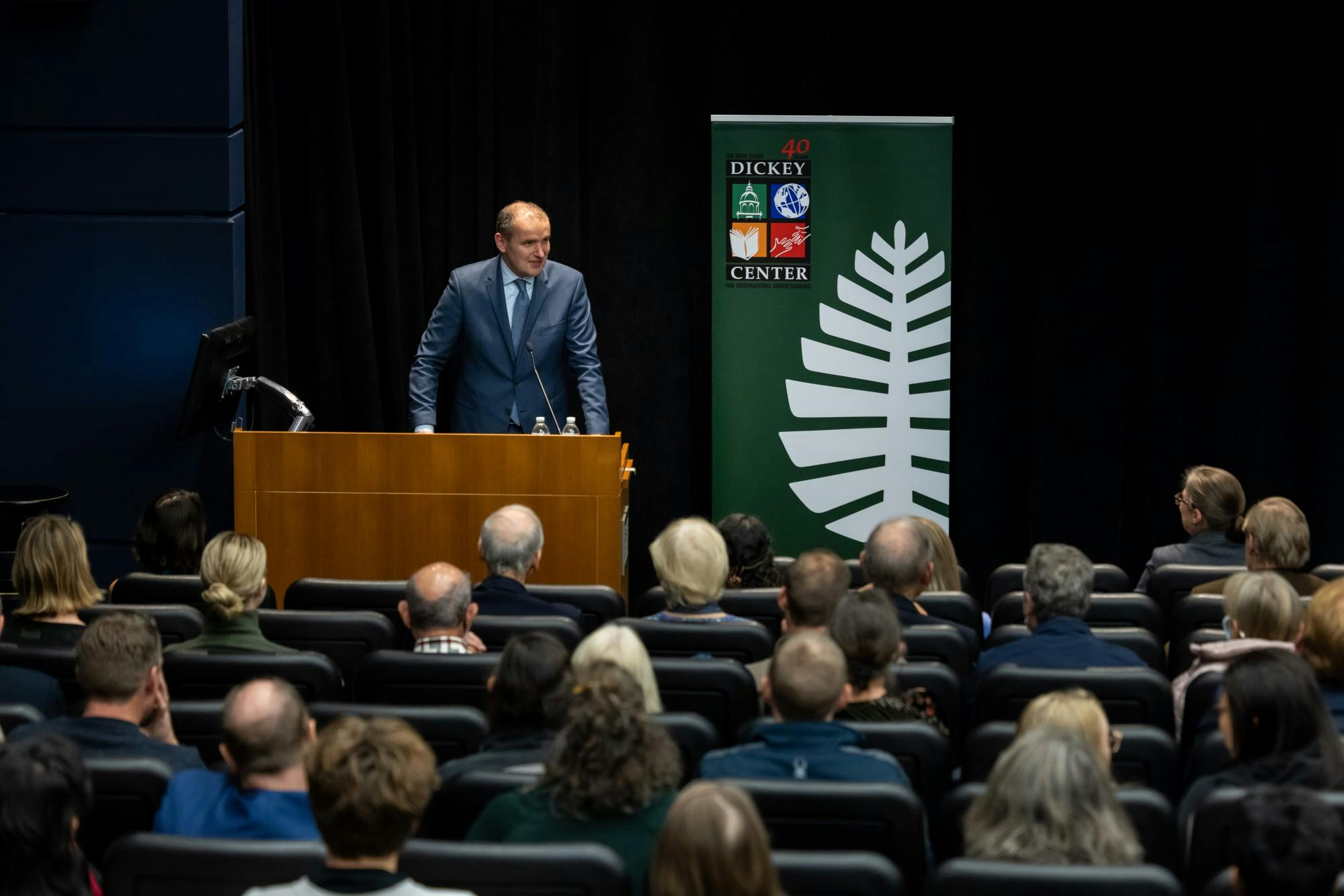On Tuesday, President of Iceland Dr. Guðni Thorlacius Jóhannesson delivered the 2022 Stefansson Memorial Lecture at the Loew Auditorium. The lecture, entitled “Small Iceland: Reflections on Independence and Interdependence, Nationalism, and Globalization,” was a joint project between the Stefansson Arctic Institute — an independent research institution affiliated with the Icelandic government — and Dartmouth’s Institute of Arctic Studies at the John Sloan Dickey Center for International Understanding, and is part of a 25-year partnership between the two organizations.
Before the lecture, Jóhannessen said that he hoped his visit would not only “strengthen the ties that already exist between Dartmouth” and Iceland, but also promote a “notion of positive pride in your past, present, and future capabilities without arrogance, without aggression, and without suspicion towards others,” and “introduce Iceland’s place in the world” to a new audience.
“I hope [students] will have a good time and learn something about Iceland, and about how we, in Iceland, can possibly play a role on the international scene,” Jóhannessen said. “We're a small country, but still, we should be able to make ourselves heard in a positive manner.”
Jóhannesson began the lecture with the challenges Iceland faced during World War II, as its citizens were unsure whether the “tiny island in the North Atlantic” could survive on its own. Over the course of six presidencies, however, Jóhannesson explained that Iceland no longer struggles with questions of political and economic sovereignty — and now instead grapples with questions of what to do with that power. Iceland is an independent nation in an interdependent and globalized world, he argued — a fact that brings with it unique challenges.
A central portion of Jóhannesson’s lecture was dedicated to explaining how Iceland achieved economic independence. After gaining political sovereignty, Jóhannesson said that the country “needed to gain full sovereignty” over its natural resources, pointing primarily to the fishing industry, which the British sought to control. Following decades of conflict over control of Iceland’s fisheries, however, Jóhannesson explained to the audience how the nation’s leaders were able to leverage their military partnership with the United States, who maintained a base on the island during the Cold War, to force the British to acquiesce.
“I believe that what Iceland can do to promote its policy in the Arctic [and] constantly spread that message of the Arctic as free from military usage. We realize that we will never have the final say there — but unless we use our voice, nothing will change,” Jóhannesson said.
Although Iceland had both political and economic independence following the end of its territorial dispute with the British in 1976, the path forward for the small nation remained uncertain, Jóhannesson argued. In an increasingly globalized and interdependent world, nationalism and independence had to be balanced with a spirit of openness. In the modern world, leaders can only have a “love for your country, a love for your history, a love for your community [while] being open, inclusive, tolerant, understanding, accommodating, welcoming,” Jóhannessen said.
Following his prepared remarks, Jóhannessen took questions from students in the audience on topics ranging from natural resource management to climate change. When the formal questions ended, he remained at the stage to speak with students and take photos. Duncan Caramichael ’24 said that Jóhannessen had a lot “to say about how smaller countries like Iceland can navigate the political landscape going forward.”
Adam Salzman ’24 said that hearing Jóhannessen speak was an “unparalleled opportunity” for someone interested in Arctic politics and globalization.
“It was awesome,” Salzman said. “He’s a very funny, charismatic head of state. I felt like I learned a lot about the different challenges that Iceland is facing today. And I learned a lot more about the potential opportunities and some issues going forward.”
Former U.S. Ambassador to Iceland Day Mount ’62, who attended the event, said that Iceland has a unique perspective that needs to be heard. “They are up in the middle of the North Atlantic, and I respect the fact that they are ready to reach out,” he said, noting that “the strength of a small country is that things can happen that could never happen in the United States.”
Prior to the evening lecture, Jóhannessen attended a lunch with members of Stefansson Institute and the Institute of Arctic Studies, and also met with College President Phil Hanlon according to Melody Brown Burkins, the director of Dartmouth’s Institute for Arctic Studies. After viewing the Orozco murals, Jóhannessen visited the Stefansson Polar Collection at Rauner Library for a tour of handpicked pieces from the collection.
“[During] my visit I hope… to strengthen the ties that already exist already between Dartmouth and Iceland, and to meet new friends, and see old friends as well,” Jóhannessen said.




